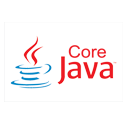
Java programming language is developed by Sun Microsystems. Java is object oriented, platform independent, simple, secure, architectural–neutral, portable, robust, multi threaded, high performance, distributed and dynamic. It can be used to develop software and also applets. A java program can run on various operating systems without rewriting the code. And this is possible because of java run-time environment which tells the operating system what to do by interpreting the java code.
Java is a perfect programming language for anybody who wants to learn Object Oriented Concepts. In our core java training, at Deccansoft, the best of the teaching methodologies are followed so that the students can gain the best of knowledge on each and every topic in the course. As we have expert trainers with long real time experience, we deliver training with practical real time awareness along with the theoretical understanding. Students are guided through the training in such a way that they can develop a standalone application using swings by the end of core java training course.
Deccansoft is the ultimate core java training institute. We can proudly say that students trained at our institute have very good command on the subject than those trained elsewhere. Course material covering all the topics is given to help the students learn better. Daily assignments and regular assessments are conducted to help groom their technical skills. Good learning environment, regular assistance and well cataloged training procedures are the key features of Deccansoft core java Training in Hyderabad.
The objectives of this course are:
This course is designed to meet the needs of those who want to be professional Java developers. This will also help the audience to get through the Java Programmer Certification.
Students should be familiar with basic programming techniques and have some real programming experience, preferably with procedural programming languages, and ideally with C. Even though C++ is not required, prior knowledge of it will be an added advantage.
Related Searches to Reach us